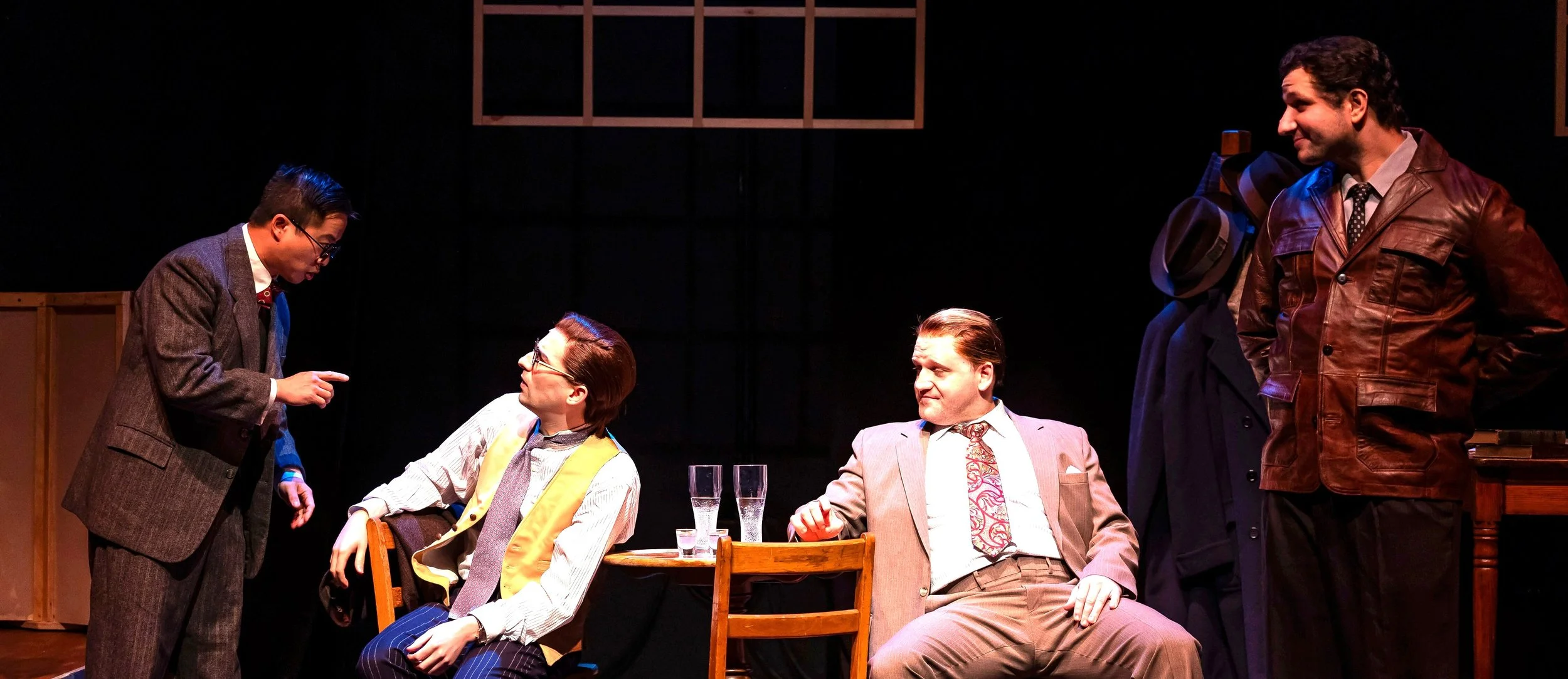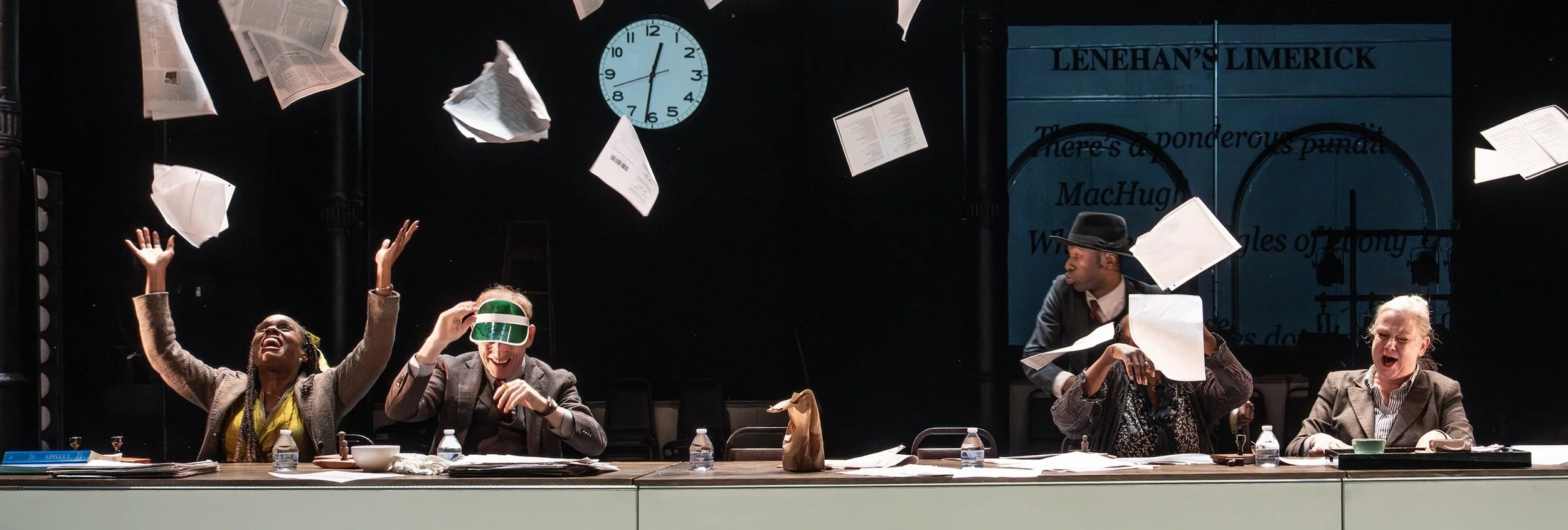The line between finding fame and losing one’s mind is disturbingly blurred in the Vineyard Theatre production of Scene Partners, the latest quirky work from mind-bending playwright John J. Caswell Jr. Operating on as many as four different levels of consciousness, this messy, stratified tale is held together, barely, by director Rachel Chavkin, who utilizes the strongest of glues: a sure-handed and deeply felt performance from her lead actor, Dianne Wiest.
War Words
War Words, assembled by Michelle Kholos Brooks from the words of some dozen veterans of the Iraq and Afghanistan Wars, is simplicity itself, and all the stronger for it. The show thrusts the audience into combat and its devastating aftereffects. You may quibble here and there with the presentation and the choices of what’s included and what isn’t, but it’s unlikely that you’ll leave A.R.T./New York unmoved.
Ode to the Wasp Woman
It’s a noir. It’s a drama. It’s a comedy, maybe. It’s Ode to the Wasp Woman, Rider McDowell’s history of B-level stardom in long-ago Hollywood. Graced by Sean Young (Blade Runner, Wall Street), a Hollywood leading lady whose own career history is pretty colorful, Wasp Woman has its attractions, but coherence and insight aren’t among them.
I Can Get It for You Wholesale
For decades the Harold Rome–Jerome Weidman musical I Can Get It for You Wholesale has been known primarily for putting Barbra Streisand on the map. In 1962 many critics found protagonist Harry Bogen, a young Jewish hustler in New York City’s garment trade in 1937, too unlikable, even though Pal Joey and its caddish hero had succeeded in various Broadway productions. But timing also played a part. John Chapman in the Daily News noted that “his success, unlike Robert Morse’s genial villainies in How to Succeed [at a nearby theater], leaves a bad taste.” In the New York Times, Howard Taubman complained that the book was not “uplifting.” Now that antiheroes are commonplace, however, Wholesale deserves another look, and the Classic Stage Company’s loving revival (with a book updated by Jerome’s son John Weidman) provides evidence that it’s an overlooked gem.
Food
Geoff Sobelle’s Food at BAM Fisher is performance art of the most engaging kind. It provokes rumination about man’s relationship to nature, to the use of the environment, and to the distance between tilling the earth with dirty hands and the meal that arrives on a plate at home or in a restaurant. If that implies an overly serious purpose, it is brightened by Sobelle’s interactivity with his audience, his deft sleight of hand, and slapstick that veers into carnival sideshow.
Merry Me
Hansol Jung’s irreverent new comedy Merry Me is a dramaturgical mash-up that borrows freely from Euripides’s Iphigenia in Aulis, William Wycherley’s The Country Wife, and Tony Kushner’s Angels in America. Along the way it also includes allusions to (naming just a few) poems by Sappho, Fifty Shades of Grey, and The L Word. The conceit is clever and ambitious, but the elements rarely cohere. To the credit of a hardworking and resourceful cast, though, there are some funny moments, but much of the merriment seems forced rather than breezily effortless.
King of the Jews
“Power corrupts” is a global, historical truism, possibly even more so when conquerors ensnare the vanquished to do their dirty work. Such was the case for Jews in the mid–20th century in Europe’s Nazi-controlled ghettoes. The Nazis often appointed Jewish leaders to decide on the people to be deported—often a death sentence. The Jewish-run panels were called Judenrats. In Leslie Epstein’s King of the Jews, adapted from his novel of the same name, an ethnic German Nazi enforcer in Łódź, Poland, authorizes a group of Jews to select fellow Jews for deportation.
Sabbath’s Theater
Philip Roth’s 1995 novel Sabbath’s Theater is considered outrageous and raunchy even by Rothian standards, with retired, arthritic puppeteer Mickey Sabbath making Alexander Portnoy—the hero of Roth’s 1969 novel Portnoy’s Complaint, which launched his career—look tame by comparison. For Mickey there is no desire for redemption or decency; there is only narcissistic pleasure-seeking, misanthropy, and self-gratification at any cost. All of which begged the question, in a recent New York Times piece on John Turturro and writer Ariel Levy, who co-adapted the novel into a playscript, “Is 2023 ready for Sabbath?”
Poor Yella Rednecks
By this point, the plays of Qui Nguyen are starting to look like “seen one, seen them all.” From his earliest productions, for downtown theater troupe Vampire Cowboys, Nguyen’s works have their hallmarks: comic-book-style scenic design, martial arts, superhero and pop-culture fandom. The playwright has often been acclaimed for inventive storytelling and stagecraft. But now that he’s deployed the same gimmicks in play after play, their novelty has worn off. In Poor Yella Rednecks, Nguyen’s latest show to debut in New York, they seem obtrusive. The play is solidly plotted, with thoughtful, moving dialogue scenes. It could shed all the whiz-bang surrealities and still be a worthwhile, entertaining dramedy.
Emergence
Things are not as they seem,” intones Patrick Olson, the creator and driving force behind Emergence, an uncanny conceptual performance that merges art, science, music, and monologue and may well be the most original Off-Broadway show this season. Accompanied by an ensemble of four singers, three dancers, and a rock band, Olson invites theatergoers on a transformative journey that tears off the veil from familiar things and explores the deepest aspects of the human experience.
Arms and the Man
Gingold Theatrical Group (GTG) is back at Theatre Row with Bernard Shaw’s 1894 comedy Arms and the Man, directed by David Staller. In the 17 years since its founding, GTG has presented all 65 of Shaw’s plays in full productions or staged readings at least once (generally with élan), and Staller has become our nation’s foremost Shavian outside academia.
Stereophonic
A huge audio console occupies center stage in the Playwrights Horizons’ unhurried and precisely observed world premiere of Stereophonic. This makes sense not only because all of the action is set within the close confines of a music studio, but also because it is an apt metaphor for what playwright David Adjmi and songwriter Will Butler have in mind. Their musical drama chronicles a year in the life of a rock band and its tech team as they go about recording a new album. Decibel levels rise and fall as tensions mount, then subside, while the chance for harmony among the bandmates is continually thwarted by their insecurities, jealousies and self-indulgences. It’s a volatile mix.
Telling Tales Out of School
Four matrons of the Harlem Renaissance, all feisty, confident, and accomplished authors, activists, and folklorists, recall racial discrimination and the realities of a man’s world in Wesley Brown’s Telling Tales Out of School. Set in 1954, a seminal moment for civil rights, the play finds the quartet—Zora Neale Hurston (Elizabeth Van Dyke), a black anthropologist and author; Nancy Cunard (June Ballinger), a white, left-leaning Cunard heiress, activist and editor; Jessie Fauset (Richarda Adams), a black editor and poet; and Nella Larsen (Petronia Paley), a biracial former nurse and novelist—becoming reacquainted in Brown’s imagined reunion.
Redwood
Drew Tatum, a character in Brittany K. Allen’s play Redwood, would never want to be one of those white people who says something like “I would have voted for Obama for a third term if I could”—that infamous line in Jordan Peele’s Get Out. During an uncomfortable encounter with a Black person, Drew does say, “The woman I love is Black. Oh, God, I swore I’d never say that to prove a point.”
Daphne
In “Ballad of a Thin Man” Bob Dylan sings, “Something is happening here, but you don’t know what it is,” a refrain that applies perfectly to Daphne (Jasmine Batchelor), the eponymous character in a new play by Renae Simone Jarrett at LCT3’s Claire Tow Theater. Something is certainly happening to Daphne, psychologically and physically, but the uncanny transformation doesn’t obey the conventional rules of time or space, and nothing may be what it seems.
All the Devils Are Here
Patrick Page’s investigation into Shakespeare’s villains is a master class on the Bard and a bravura demonstration of Shakespearean acting. In All the Devils Are Here: How Shakespeare Invented the Villain, Page brings a lifetime of performing and thinking about Shakespeare to the stage. He inhabits characters running the full range of Shakespeare’s dramatic career and imparts some of the wisdom he has accrued along the way, summoning evil spirits one moment and serving as congenial, good-natured, and charismatic host into the heart of darkness the next.
Chasing Happy
Chasing Happy, a new play by Michel Wallerstein, takes its name from the title of a best-selling, posthumously published book by John Ryan, the late partner of the play’s main character, Nick. John was killed by a gunman at a Pride parade, a crime that Nick calls “random.” Based on the excerpts Nick reads from the memoir cum self-help tome, John—who was born post-Stonewall and lived in Provincetown, Mass.—was wracked with self-loathing and shame about his homosexuality and remained closeted with many people. His book offers such banal affirmations as “I exist, I am worthy, I am love” and “Let me become who I truly am.” (Another character describes it as “one big stew of Deepak Chopra, Marianne Williamson and Eckhart Tolle, mixed with some gay cliché stuff.”)
Partnership
An advantageous business offer, with a loveless marriage thrown in: this is one of the would-be “partnerships” around which Elizabeth Baker’s 1917 drama Partnership, a feminist parable and Romantic cri de coeur in the guise of a comedy of manners, revolves. As is so often the case with the plays that the Mint Theater Company rescues from obscurity, the issues are both historically specific and still relevant. Must the demands of business always be at odds with personal nourishment? Should one prize practicality or love? Does respectability entail a life of drudgery, while a life well lived means being branded as “mad”?
Scrambled Eggs
Reginald L. Wilson pulls no punches when it comes to tackling the subject of domestic violence in his new play, Scrambled Eggs. Directed by Fulton C. Hodges, and coinciding with Domestic Violence Awareness Month, the work explores this major public health problem in all its terrible guises. Set in Tallahassee, Fla., the family drama centers on Terrence (Wilson), a construction worker in his 40s who has trouble holding down a job because of alcohol and marijuana. He’s married to Sable (Tatiana Scott), a college graduate with a degree in education who left her teaching job after Terrence persuaded her to stay home and devote her time to family and their primary schooler named Lil T (Christopher Woodley).
The Lights Are On
In addition to crafting an engrossing thriller, dramatist Owen Panettieri shows a gift for prognostication with The Lights Are On. He wrote the play before the pandemic—it had been set for a fall opening in 2020 when COVID shut down all theater—yet it has a character who hoards toilet paper and face masks, wipes down the groceries and stays home all the time.


























